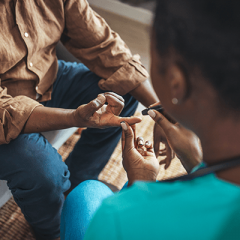In Partnership with Gilead Sciences and the Lowitja Institute, The Poche Centre for Indigenous Health is today unveiling The Guiding Local Opportunities for Wellbeing (GLOWS) Indigenous Health Grant Program.
The new $4.4M, 3-year initiative has been co-created to to support Aboriginal and Torres Strait Islander communities in their efforts toward elimination of HIV and viral hepatitis. The initiative will enable Indigenous-led solutions to be designed to address the needs of Aboriginal and Torres Strait Islander communities affected by, or at risk of, HIV and viral hepatitis. The aim of the initiative is to increase health equity and address disparities that continue to drive disease transmission.
Director of the UQ Poche Centre for Indigenous Health Professor James Ward says, “For far too long, we as a nation have accepted disparity and inequity in the areas of HIV and viral hepatitis among Aboriginal and Torres Strait Islander peoples. The time has come to change this discourse. We now have the science to start to dream of eliminating as well as drastically improve the lives of people living with HIV and viral hepatitis but where we often fail is in the implementation of science at a local level. That’s why this initiative is so important as it provides a mechanism that will enable communities to drive local evidenced-based solutions matched to local needs.”
Despite advancements in HIV and viral hepatitis, the rates of diagnosis are disproportionately higher in Aboriginal and Torres Strait Islander communities compared with the non-Indigenous population. In 2022 rates of hepatitis C notifications were seven times greater among the Aboriginal and Torres Strait Islander communities compared with the non-Indigenous population (156.2 compared to 21.7 per 100,000).[i] Additionally, HIV notification rate for Aboriginal and Torres Strait Islander communities was 1.3 times the rate for the non-Indigenous population (4.9 compared to 3.8 per 100,000).[ii]
“Aboriginal and Torres Strait Islander peoples know well the impact of blood borne viruses, like HIV and viral hepatitis, on our peoples and our communities. We understand the needs of our communities and we know the solutions that work. In addressing the disparities that continue to drive disease transmission, it is vital that our communities are centred and that Indigenous-led solutions are prioritised,” said CEO of the Lowitja Institute, Adjunct Professor Janine Mohamed.
“In delivering the GLOWS Indigenous Health Grant Program program, Lowitja Institute is committed to putting the science back into Aboriginal and Torres Strait Islander community hands. Lowitja Institute works to supporting Aboriginal and Torres Strait Islander communities to grow their research ideas, and action community priorities through meaningful research projects. We are excited to hear from Aboriginal and Torres Strait Islander organisations about how to meet the needs of Aboriginal and Torres Strait Islander people and improve the unacceptable health inequities in areas of HIV and viral hepatitis.”
The GLOWS Indigenous Health Grant Program represents Gilead Sciences’ largest ever commitment to health equity for Indigenous communities globally with a total of $6M USD to be invested equally in Australia and Canada over three years ($3M USD to each country).
“As a company deeply committed to health equity, Gilead recognises that Australia will not reach the UN targets for viral hepatitis and HIV unless significant investment and focus is made on priority populations. We know that Aboriginal and Torres Strait Islander communities are still experiencing significant inequities in access to prevention, treatment, care and health outcomes compared with non-Indigenous communities due to the continued impacts of colonisation in Australia. We also know truly Aboriginal and Torres Strait Islander community-led and informed solutions are vital to making change here,” said Jaime McCoy, General Manager, Gilead Sciences Australia and New Zealand.
In year one of the program, five different grant types will be offered which will focus on large and medium projects: providing opportunities for research and community programs for community needs, incubator, seed or demonstration grants, scholarships and education grants. Funding tiers will range from AUD $800,000 over two years, to seeding grants and scholarships of $30,000 and $25,000.
The first cohort of funded projects will be announced in March 2024. For more information about the program or to apply visit lowitja.org.au/research/funding-opportunities.



